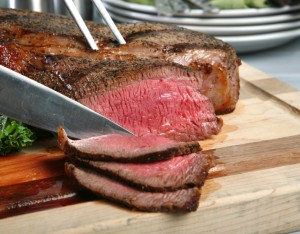Health Canada has started reviewing the food safety of mechanically tenderized beef. Food Poisoning Bulletin has told you about this issue before. There is currently an E. coli 0157:H7 outbreak in Canada linked to mechanically tenderized steaks produced by the embattled XL Foods facility in Alberta.
 Mechanically tenderized beef has been pierced with needles or blades to break up the fibers in the meat. This automatically makes the meat more tender, but it can also bring bacteria from the surface of the meat into the interior. That piece of meat, cooked rare or medium, could be the perfect vehicle for deadly bacteria transmission. Normally, the interior of a solid cut of beef does not contain pathogenic bacteria, since it is solid muscle tissue.
Mechanically tenderized beef has been pierced with needles or blades to break up the fibers in the meat. This automatically makes the meat more tender, but it can also bring bacteria from the surface of the meat into the interior. That piece of meat, cooked rare or medium, could be the perfect vehicle for deadly bacteria transmission. Normally, the interior of a solid cut of beef does not contain pathogenic bacteria, since it is solid muscle tissue.
The review is studying the likelihood that the tenderizing process can spread bacteria, along with the steps the beef industry can take to prevent beef from contamination in the first place. Health CAnada is also working to identify mechanically tenderized beef for consumers through “labels, signage, or other means”. These treated cuts are not labeled now, and there is no way for the consumer to tell if the meat has been tenderized, since the needle holes disappear right after treatment.
While the investigation is being conducted, Health Canada and the Public Health Agency of Canada are encouraging people to cook mechanically tenderized beef to an internal temperature of 160 degrees F, or well-done. While the Health Canada statement says this is “medium” doneness, all culinary references say that temperature is considered well-done.
Other steps you should take when handling meat include: wash your hands thoroughly with warm water and soap before and after handling raw meat, keep knives, counters, and cutting boards clean, and keep raw meats separate from other foods. Always refrigerate or freeze leftovers promptly.




